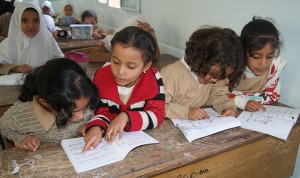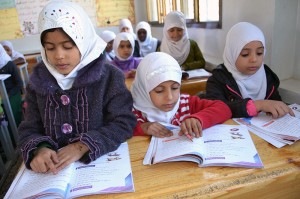[vc_row][vc_column width=”1/1″][vc_column_text]
Active learning revitalizes Yemeni curriculum
By Salwa Al-Azzani
[/vc_column_text][/vc_column][/vc_row][vc_row][vc_column width=”2/3″][vc_column_text]Sanaa, Yemen—Real learning happens when a child can interact with a concept and truly understand it firsthand. Rote memorization and lectures crammed with information have proven to be ineffective. Unfortunately, these teaching methods have been standard practice in Yemen for years.
This academic year, Yemen’s early grade science, math and reading curriculum is getting an active learning makeover thanks to the Yemen Early Grade Reading Approach, a USAID-funded initiative that teaches literacy through interactive lessons, stories and phonics. The project is implemented by Creative Associates International.
The Ministry of Education is modeling its curriculum redesign on the successes of the reading approach—breathing new life into a curriculum that has not been updated since it was reviewed 20 years ago, according to Dr. Mohammed Mekhlafi, lecturer and Dean at Sana’a University.
Using this creative method “children speak, read, draw and write. Children simply interact with what they learn,” says Hussein Al-Absi, a specialist in science and a team leader of the science subject reform effort at the Ministry. “It’s interesting in the fact that it has a variety of activities, such as plays, quizzes, stories and drawings that teachers practice with their children, making reading fun—activities that will make other subjects fun as well.”
Following successes during the trial phase of the reading approach, in which children’s reading ability jumped from just 5 words per minutes to 25 words per minute using the interactive lessons, the Ministry decided to initiate a review of its curricula, especially for first grade math and science.
Common concepts across subjects
 By integrating common vocabulary and themes across math, science and reading, children become more comfortable with the concepts and gain a deeper understanding of what they are learning.
By integrating common vocabulary and themes across math, science and reading, children become more comfortable with the concepts and gain a deeper understanding of what they are learning.
The curriculum “uses sounds and words that children have already learned in previous lessons….I reinforced the words from the YEGRA materials in[to] the math subject reform,” explains Saeed Naji Al-Sharajabi a mathematics specialist and team leader of the math subject reform effort at the ministry.
“For instance, the words ‘ant,’ ‘milk,’ ‘mama’ and ‘papa’ are repeatedly mentioned in the material. I focused on the same words and the number of images that children see in the book to introduce numbers in a simple way, and I have utilized the different images and shapes in the book to introduce simple mathematical equations.”
A tried-and-true approach
Al-Sharajabi is part of a Ministry team of 15 curriculum reform leaders in the curriculum and trainings sectors—designated by former Minister of Education Abdulrazzaq Al-Ashwal and led by technical experts from Yemen Early Grade Reading Approach team.
In planning its curriculum reform in other subjects, the Ministry’s curriculum and training sectors will also replicate the holistic methodology of the Yemen Early Grade Reading Approach, including an enhanced cascade model of training teachers and a professional development model that employs coaching in reading instruction to professional learning communities.
Also drawing from the reading approach, the Ministry will organize trainings around practice-in-training with children. Trainers will be selected based on merit and successful performance on assessments and in interviews. The ministry will deploy the logistical and administrative procedures utilized in Yemen Early Grade Reading Approach support and follow-up mechanisms, which have proven efficient and effective.
Interactive lessons, better learning
Yemeni educators have long advocated for curriculum changes that target both the structure and the content of lessons, noting that a more child-centered approach allows children to interact with and understand what they learn.
Teachers interviewed report that the traditional curriculum tends to emphasize memorization and often covers several topics in a very limited time. They say that in these environments, children are passive learners and often try to simply memorize information without actually learning it. Ultimately, this leads to bored, unengaged students and poor performance.
Active learning, as many teachers who have implemented the Yemen Early Grade Reading Approach have attested, is reversing this trend.
 “This approach is excellent. Children are very excited to have the YEGRA books, and they are very excited about reading with me,” says No’om Abdulaziz, a teacher in Al-Wahdah school in the Amant Al –Asimah district and a trained teacher in the approach.
“This approach is excellent. Children are very excited to have the YEGRA books, and they are very excited about reading with me,” says No’om Abdulaziz, a teacher in Al-Wahdah school in the Amant Al –Asimah district and a trained teacher in the approach.
Abdulaziz says that the books, games and lessons of the approach make Arabic reading fun and interesting for her students, and she anticipates improved outcomes as interactive learning spreads to other subject areas.
“The old Ministry book that we used in the past had no images and a lot of text. It treats students as passive learners, and all they do in class is sit and listen without interacting with the teacher. Arabic felt like a dry subject. It’s more fun now, and I am glad that science and math subjects have also been revised in accordance with the YEGRA approach and are made more interactive and consistent so learning is more meaningful for our children!”
Edited by Jillian Slutzker[/vc_column_text][/vc_column][vc_column width=”1/12″][/vc_column][vc_column width=”1/4″][vc_widget_sidebar sidebar_id=”sidebar-primary”][/vc_column][/vc_row]